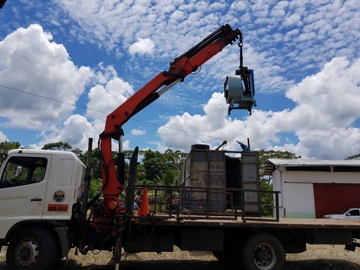Andes Bioenergy
Ecuadorian entrepreneur works on the up-cycling of agro-industrial biomass waste
Mario Salgado has developed a process to produce biochar from agribusiness biomass wastes which can improve tropical soils as well as provide renewable thermal energy. With his start-up “Andes Bioenergy” he is engaged in several demonstration projects and is scaling up the prototypes of his reactor. Mario Salgado is also the first winner of the Elsevier-ISC3 “Entrepreneurial Spirit in Sustainable Chemistry Award”.
Year of Foundation:
2015
Addresses the following SDGs:
SDG 1 (no poverty), SDG 2 (zero hunger), SDG 7 (affordable and clean energy), SDG 8 (decent work and economic growth), SDG 9 (industry, innovation and infrastructure, SDG 13 (climate action), SDG 15 (life on land), SDG 17 (partnerships for the goals)
First Reactors sold:
2018




